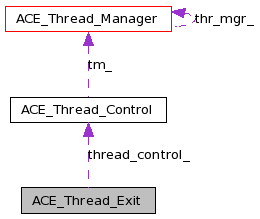Keep exit information for a Thread in thread specific storage. so that the thread-specific exit hooks will get called no matter how the thread exits (e.g., via <ACE_Thread::exit>, C++ or Win32 exception, "falling off the end" of the thread entry point function, etc.). More...
#include <Thread_Exit.h>

Public Member Functions | |
| ACE_Thread_Exit (void) | |
| Capture the Thread that will be cleaned up automatically. | |
| void | thr_mgr (ACE_Thread_Manager *tm) |
| Set the ACE_Thread_Manager. | |
| ~ACE_Thread_Exit (void) | |
Static Public Member Functions | |
| static ACE_Thread_Exit * | instance (void) |
| Singleton access point. | |
| static void | cleanup (void *instance) |
Private Attributes | |
| ACE_Thread_Control | thread_control_ |
Static Private Attributes | |
| static bool | is_constructed_ = false |
Keep exit information for a Thread in thread specific storage. so that the thread-specific exit hooks will get called no matter how the thread exits (e.g., via <ACE_Thread::exit>, C++ or Win32 exception, "falling off the end" of the thread entry point function, etc.).
This clever little helper class is stored in thread-specific storage using the <ACE_TSS> wrapper. When a thread exits the <ACE_TSS::cleanup> function deletes this object, thereby closing it down gracefully.
Definition at line 42 of file Thread_Exit.h.
| ACE_Thread_Exit::ACE_Thread_Exit | ( | void | ) |
Capture the Thread that will be cleaned up automatically.
Definition at line 73 of file Thread_Exit.cpp.
{
ACE_OS_TRACE ("ACE_Thread_Exit::ACE_Thread_Exit");
}
| ACE_Thread_Exit::~ACE_Thread_Exit | ( | void | ) |
Destructor calls the thread-specific exit hooks when a thread exits.
Definition at line 92 of file Thread_Exit.cpp.
{
ACE_OS_TRACE ("ACE_Thread_Exit::~ACE_Thread_Exit");
}
| void ACE_Thread_Exit::cleanup | ( | void * | instance | ) | [static] |
Cleanup method, used by the ACE_Object_Manager to destroy the singleton.
Definition at line 15 of file Thread_Exit.cpp.
{
ACE_OS_TRACE ("ACE_Thread_Exit::cleanup");
delete (ACE_TSS_TYPE (ACE_Thread_Exit) *) instance;
// Set the thr_exit_ static to null to keep things from crashing if
// ACE::fini() is enabled here.
ACE_Thread_Manager::thr_exit_ = 0;
ACE_Thread_Exit::is_constructed_ = false;
// All TSS objects have been destroyed. Reset this flag so
// ACE_Thread_Exit singleton can be created again.
}
| ACE_Thread_Exit * ACE_Thread_Exit::instance | ( | void | ) | [static] |
Singleton access point.
Definition at line 35 of file Thread_Exit.cpp.
{
#if defined (ACE_HAS_THREAD_SPECIFIC_STORAGE) || defined (ACE_HAS_TSS_EMULATION)
ACE_OS_TRACE ("ACE_Thread_Exit::instance");
// Determines if we were dynamically allocated.
static ACE_TSS_TYPE (ACE_Thread_Exit) * volatile instance_;
// Implement the Double Check pattern.
if (!ACE_Thread_Exit::is_constructed_)
{
ACE_MT (ACE_Thread_Mutex *lock =
ACE_Managed_Object<ACE_Thread_Mutex>::get_preallocated_object
(ACE_Object_Manager::ACE_THREAD_EXIT_LOCK);
ACE_GUARD_RETURN (ACE_Thread_Mutex, ace_mon, *lock, 0));
if (!ACE_Thread_Exit::is_constructed_)
{
ACE_NEW_RETURN (instance_,
ACE_TSS_TYPE (ACE_Thread_Exit),
0);
ACE_Thread_Exit::is_constructed_ = true;
ACE_Thread_Manager::set_thr_exit (instance_);
}
}
return ACE_TSS_GET (instance_, ACE_Thread_Exit);
#else
return 0;
#endif /* ACE_HAS_THREAD_SPECIFIC_STORAGE || ACE_HAS_TSS_EMULATION */
}
| void ACE_Thread_Exit::thr_mgr | ( | ACE_Thread_Manager * | tm | ) |
Set the ACE_Thread_Manager.
Definition at line 81 of file Thread_Exit.cpp.
{
ACE_OS_TRACE ("ACE_Thread_Exit::thr_mgr");
if (tm != 0)
this->thread_control_.insert (tm, 0);
}
bool ACE_Thread_Exit::is_constructed_ = false [static, private] |
Used to detect whether we should create a new instance (or not) within the instance method -- we don't trust the instance_ ptr because the destructor may have run (if ACE::fini() was called). See bug #526. We don't follow the singleton pattern due to dependency issues.
Definition at line 74 of file Thread_Exit.h.
Automatically add/remove the thread from the ACE_Thread_Manager.
Definition at line 65 of file Thread_Exit.h.
 1.7.0
1.7.0